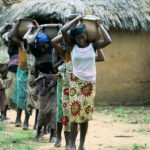The Aliko Dangote Foundation (ADF) has commenced the implementation of its ‘Aliko Dangote Foundation Integrated Nutrition (ADFIN)’ programme in Kano State, northwest Nigeria.
Participants were drawn from the state Ministry of Health, community health extension workers, nutrition focal persons, maternal and child health coordinators, and primary health care coordinators.
Development Diaries understands that no fewer than 30 health workers have been trained by the foundation following a five-day programme.
The training, according to ADF’s Director of Health and Nutrition, Dr Francis Aminu, was in line with the plan to utilise the newly refurbished primary health care centres across five local government areas of the state.
According to the United Nations Children’s Emergency Fund (UNICEF), Nigeria has the second-highest burden of stunted children in the world, with a national prevalence rate of 32 percent of children under age five.
Over two million children suffer from severe acute malnutrition (SAM) in the country, and only two out of every ten affected children are reached with treatment.
Studies also show that Nigeria’s northern states are most affected by the two forms of malnutrition – stunting and wasting.
Speaking at the training in Kano, Aminu explained that the participants were being trained in the areas of assessing and administering treatment and providing care for malnourished children.
‘The purpose of the training was to equip the health workers with the requisite skills on how to assess, treat and care for malnourished children under the age of five’, he said.
‘The five-day training enabled participants to gain in-depth knowledge in line with the training requirements as stated in the National Integrated Management of Acute Malnutrition Guidelines’.
For his part, the Commissioner of Health, Kano State, Dr Aminu Ibrahim Tsanyawa, represented by the Permanent Secretary, Kano State Ministry of Health, Amina Musa, commended the foundation for its contribution to human capital development.
Photo source: UNICEF Ethiopia





